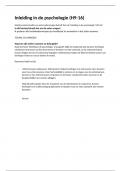Inleiding in de psychologie (H9-16)
Hierbij voorzie ik jullie van extra oefenvragen betreft het vak ‘inleiding in de psychologie’ (H9-16).
In dit bestand draait het om de oefen vragen!
Ik probeer alle hoofdonderwerpen per hoofdstuk te verwerken in het oefen examen.
TOTAAL 161 VRAGEN!
Waarom zijn oefen examens zo belangrijk?
Zoals het boek ‘Inleiding in de psychologie’ al aangeeft, blijkt uit onderzoek dat wanneer leerlingen
uitsluitend vertrouwen op het doornemen of herlezen van het materiaal, ze de verkeerde indruk
kunnen krijgen dat ze het onderwerp begrijpen. Oefentoetsen helpen de kloof te dichten tussen wat
leerlingen weten en wat ze denken te weten.
Daarnaast helpt het bij:
- Zelfvertrouwen opbouwen: Oefentoetsen helpen leerlingen om vertrouwen op te bouwen
voor hun echte examens. Door herhaaldelijk te oefenen en te slagen voor de oefentoetsen,
kunnen ze hun zelfvertrouwen vergroten en zich beter voorbereid voelen wanneer ze de
daadwerkelijke test moeten afleggen.
- Hulp bij zelfevaluatie: Door de resultaten van de oefentoetsen te analyseren, kunnen
leerlingen hun studievoortgang bijhouden en bepalen waar ze extra aandacht aan moeten
besteden.
Succes!
,H9 QUESTIONS
I. What is the definition of executive functions?
1. The part of memory that stores events or experiences
2. The process of holding verbal and visual-spatial information
3. Mechanisms for information processing that are important for regulating
behavior, planning, and executing complex cognitive tasks
4. The cognitive ability to regulate emotions, thoughts, and behaviors
II. What are the three related components of executive functions?
1. Recall, Recognition, Encoding
2. Attention, Perception, Memory
3. Updating, Switching, Inhibition
4. Verbal, Visual, Spatial
III. What is the definition of working memory?
1. The cognitive ability to regulate emotions, thoughts, and behaviors
2. The ability to control the flow of information from sensory memory to short-
term memory
3. The part of executive functions responsible for holding verbal and visual-
spatial information
4. The process of storing events or experiences
IV. What is the difference between episodic memory and semantic memory?
1. Episodic memory is conscious and intentional, while semantic memory is
automatic and unconscious
2. Episodic memory is long-lasting and stable, while semantic memory is fleeting
and less stable
3. Episodic memory stores events or experiences, while semantic memory stores
verbal and visual-spatial information
4. Episodic memory is personal and related to oneself, while semantic memory is
general knowledge and facts
V. What is iconic memory?
1. The encoding and retrieval of information in long-term memory
2. The unconscious processing of sensory input
3. The short-term memory for a specific sound
4. The short-term memory for a specific visual stimulus
VI. What is echoic memory?
1. The encoding and retrieval of information in long-term memory
2. The short-term memory for a specific sound
3. The short-term memory for a specific visual stimulus
4. The unconscious processing of sensory input
VII. What is the purpose of priming?
1. To activate information stored in long-term memory through sensory input
2. To process sensory input without conscious awareness
3. To encode and retrieve information in working memory
, 4. To temporarily retain visual information in short-term memory
VIII. What is the role of sensory memory?
1. To determine if sensory input is relevant to the task or individual's well-
being
2. To process sensory input without conscious awareness
3. To store and retain information for a short period of time
4. To encode and retrieve information in long-term memory
IX. What are the two components of working memory?
1. Episodic store and semantic rehearsal process
2. Semantic store and visual rehearsal process
3. Visual store and auditory rehearsal process
4. Phonological store and articulatory rehearsal process
X. What is the stroop interference effect?
1. The unconscious analysis of sensory input in sensory memory
2. The process of encoding and retrieving information in long-term memory
3. Slower naming of the correct color when a word is printed in a conflicting
color
4. Faster naming of the correct color when a word is printed in a matching color
, H9 ANSWERS
I. 3. Mechanisms for information processing that are important for regulating
behavior, planning, and executing complex cognitive tasks
II. 3. Updating, Switching, Inhibition
III. 3. The part of executive functions responsible for holding verbal and visual-
spatial information
IV. 4. Episodic memory is personal and related to oneself, while semantic memory is
general knowledge and facts
V. 4. The short-term memory for a specific visual stimulus
VI. 2. The short-term memory for a specific sound
VII. 1. To activate information stored in long-term memory through sensory input
VIII. 1. To determine if sensory input is relevant to the task or individual's well-
being
IX. 4. Phonological store and articulatory rehearsal process
X. 3. Slower naming of the correct color when a word is printed in a conflicting
color






